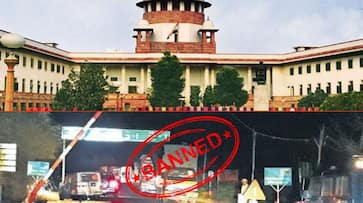The Supreme Court upheld the ban on night traffic in Bandipur, Karnataka. The ban is not just about killing of wild animals by overspeeding vehicles, it is also about human intervention in the habitat of animals and the manipulation in their behaviour due to the intervention of humans
Bengaluru: Bandipur is a forested area that is not just a heaven for tigers and wildlife, but also a pride of Karnataka.
But for the last few years, traffic on the highway that cuts across the area, especially during nights, had endangered the wildfire here as the vehicles would kill animals as they strayed on the highway.
In what comes as a major victory to Karnataka, the Supreme Court countenanced the ban on night traffic, putting an end to the litigation in which states like Kerala wanted the ban to be lifted as essential commodities would be transported through this route.
The case has a really long history with a number of environmentalists intervening in the case saying that at no cost should the ban be banned.
Talks to bury the hatchet between two chief ministers of Karnataka and Kerala in the past yielded no results as Karnataka was dead against the movement of vehicles from 9 pm to 6 am on national highway 212. But Karnataka must be lauded because it agreed to build an alternative route at a cost of Rs 75 crore to help Kerala not suffer from the ban.
Let’s move to a greater question. The ban is not just about killing of wild animals. As per the website of Conservation India (owned by Sanjay Gubbi, assistant director, Wildlife Conservation Society), the reasons are:
1. Disruption of wildlife corridors
2. Modification of animal behaviour, affecting natural movement patterns
3. Spread of invasive exotic plant species such as Parthenium and Eupatorium
4. Increased use of forest areas by humans for illegal activities such as timber smuggling, wildlife poaching, illegal transport of livestock and sand mining.
The website also added that, in Karnataka, nine out of 15 national highways and 28 out of 151 state highways pass through important wildlife habitats in the Western Ghats.
Last Updated Aug 9, 2019, 1:38 PM IST










![Salman Khan sets stage on fire for Anant Ambani, Radhika Merchant pre-wedding festivities [WATCH] ATG](https://static-ai.asianetnews.com/images/01hr1hh8y86gvb4kbqgnyhc0w0/whatsapp-image-2024-03-03-at-12-24-37-pm_100x60xt.jpg)
![Pregnant Deepika Padukone dances with Ranveer Singh at Anant Ambani, Radhika Merchant pre-wedding bash [WATCH] ATG](https://static-ai.asianetnews.com/images/01hr1ffyd3nzqzgm6ba0k87vr8/whatsapp-image-2024-03-03-at-11-45-35-am_100x60xt.jpg)


